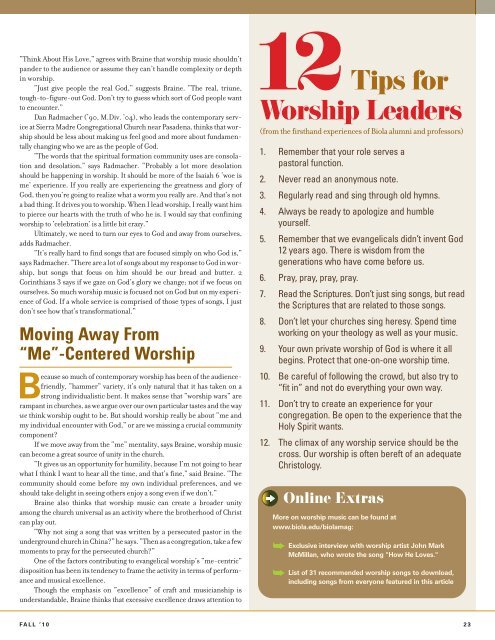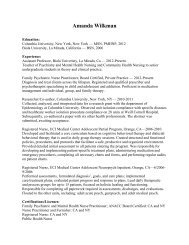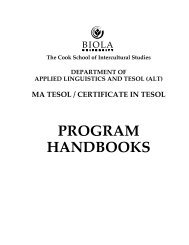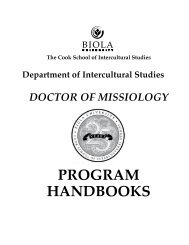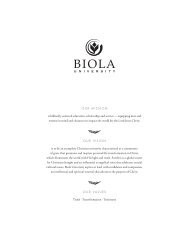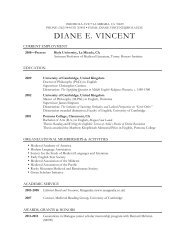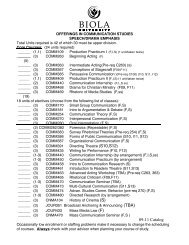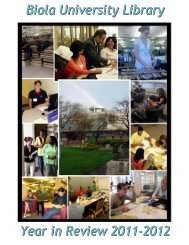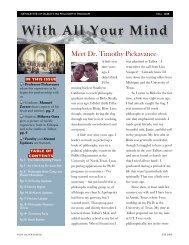You also want an ePaper? Increase the reach of your titles
YUMPU automatically turns print PDFs into web optimized ePapers that Google loves.
“Think About His Love,” agrees with Braine that worship music shouldn’t<br />
pander to the audience or assume they can’t handle complexity or depth<br />
in worship.<br />
“Just give people the real God,” suggests Braine. “The real, triune,<br />
tough-to-figure-out God. Don’t try to guess which sort of God people want<br />
to encounter.”<br />
Dan Radmacher (’90, M.Div. ’04), who leads the contemporary service<br />
at Sierra Madre Congregational Church near Pasadena, thinks that worship<br />
should be less about making us feel good and more about fundamentally<br />
changing who we are as the people of God.<br />
“The words that the spiritual formation community uses are consolation<br />
and desolation,” says Radmacher. “Probably a lot more desolation<br />
should be happening in worship. It should be more of the Isaiah 6 ‘woe is<br />
me’ experience. If you really are experiencing the greatness and glory of<br />
God, then you’re going to realize what a worm you really are. And that’s not<br />
a bad thing. It drives you to worship. When I lead worship, I really want him<br />
to pierce our hearts with the truth of who he is. I would say that confining<br />
worship to ‘celebration’ is a little bit crazy.”<br />
Ultimately, we need to turn our eyes to God and away from ourselves,<br />
adds Radmacher.<br />
“It’s really hard to find songs that are focused simply on who God is,”<br />
says Radmacher. “There are a lot of songs about my response to God in worship,<br />
but songs that focus on him should be our bread and butter. 2<br />
Corinthians 3 says if we gaze on God’s glory we change; not if we focus on<br />
ourselves. So much worship music is focused not on God but on my experience<br />
of God. If a whole service is comprised of those types of songs, I just<br />
don’t see how that’s transformational.”<br />
Moving Away From<br />
“Me”-Centered <strong>Worship</strong><br />
Because so much of contemporary worship has been of the audiencefriendly,<br />
“hammer” variety, it’s only natural that it has taken on a<br />
strong individualistic bent. It makes sense that “worship wars” are<br />
rampant in churches, as we argue over our own particular tastes and the way<br />
we think worship ought to be. But should worship really be about “me and<br />
my individual encounter with God,” or are we missing a crucial community<br />
component?<br />
If we move away from the “me” mentality, says Braine, worship music<br />
can become a great source of unity in the church.<br />
“It gives us an opportunity for humility, because I’m not going to hear<br />
what I think I want to hear all the time, and that’s fine,” said Braine. “The<br />
community should come before my own individual preferences, and we<br />
should take delight in seeing others enjoy a song even if we don’t.”<br />
Braine also thinks that worship music can create a broader unity<br />
among the church universal as an activity where the brotherhood of Christ<br />
can play out.<br />
“Why not sing a song that was written by a persecuted pastor in the<br />
underground church in China?” he says. “Then as a congregation, take a few<br />
moments to pray for the persecuted church?”<br />
One of the factors contributing to evangelical worship’s “me-centric”<br />
disposition has been its tendency to frame the activity in terms of performance<br />
and musical excellence.<br />
Though the emphasis on “excellence” of craft and musicianship is<br />
understandable, Braine thinks that excessive excellence draws attention to<br />
12 Tips for<br />
<strong>Worship</strong> Leaders<br />
(from the firsthand experiences of <strong>Biola</strong> alumni and professors)<br />
1. Remember that your role serves a<br />
pastoral function.<br />
2. Never read an anonymous note.<br />
3. Regularly read and sing through old hymns.<br />
4. Always be ready to apologize and humble<br />
yourself.<br />
5. Remember that we evangelicals didn’t invent God<br />
12 years ago. There is wisdom from the<br />
generations who have come before us.<br />
6. Pray, pray, pray, pray.<br />
7. Read the Scriptures. Don’t just sing songs, but read<br />
the Scriptures that are related to those songs.<br />
8. Don’t let your churches sing heresy. Spend time<br />
working on your theology as well as your music.<br />
9. Your own private worship of God is where it all<br />
begins. Protect that one-on-one worship time.<br />
10. Be careful of following the crowd, but also try to<br />
“fit in” and not do everything your own way.<br />
11. Don’t try to create an experience for your<br />
congregation. Be open to the experience that the<br />
Holy Spirit wants.<br />
12. The climax of any worship service should be the<br />
cross. Our worship is often bereft of an adequate<br />
Christology.<br />
More on worship music can be found at<br />
www.biola.edu/biolamag:<br />
F A L L ’ 1 0 2 3<br />
➥<br />
➥<br />
Online Extras<br />
Exclusive interview with worship artist John Mark<br />
McMillan, who wrote the song "How He Loves."<br />
List of 31 recommended worship songs to download,<br />
including songs from everyone featured in this article


